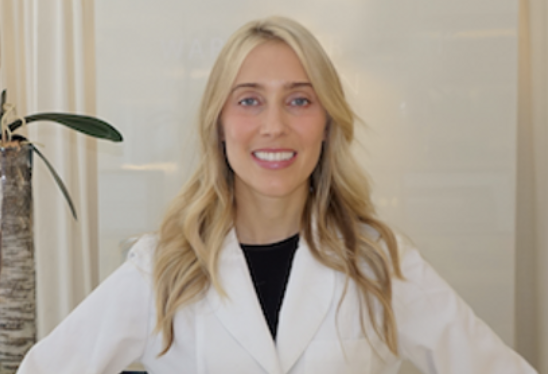Minocycline for Acne: What to Know, According to Dermatologists
You’re going to want to read up on the side effects.


Flashback to my teenage years and I had terrible, inflammatory cystic acne that refused to cooperate. Should I have considered Accutane? Probably. But instead I tried topicals like they were going out of style and cycled through every skincare routine under the sun—to no avail. Then, my dermatologist wrote me a prescription for Minocycline. “Minocycline is a type of antibiotic and is used to treat certain kinds of bacteria on the skin,” says Dr. Nava Greenfield, board-certified dermatologist at Schweiger Dermatology Group in New York City. “Oftentimes an antibiotic will be prescribed to control the amount of P. acnes—a common bacteria that contributes to acne—around hair follicles and sweat glands.”
After taking the prescription for around six weeks, I was 100-percent-no-questions-asked convinced that minocycline was made up of magic. My acne vanished and my pores shrunk. Unfortunately, the research on the medication wasn’t what it is today. I ended up taking the antibiotic for upwards of three years, which, long story short, is terrible, terrible practice and resulted in a fair share of side effects (read: GI issues, antibiotic resistance). “It’s one of my least favorite oral antibiotics and I never prescribe it,” says board-certified dermatologist and founder of Niche Dermatology in New York City Dr. Shari Marchbein. “Decades ago, we didn’t have the availability of a lot of the medicines that we have today, including more sophisticated topicals, along with more information and knowledge about what causes acne.”
Now, it’s only recommended that patients take minocycline for acne for no more than three months and under highly specific circumstances. Minocycline, along with other antibiotics like doxycycline, are generally overprescribed and, according to Dr. Marchbein, should “never, ever be used as first line therapy.” That in mind, it is still handed out by many doctors, so it’s even more important to know all the facts and be your own advocate. As such, I’ve compiled a very comprehensive guide to minocycline as it pertains to acne. From side effects I wish I knew and alternatives you should inquire about, everything you need to know is ahead.
What Is Minocycline?
Minocycline, along with another common antibiotic called doxycycline, is part of the tetracycline class of antibiotics. “It’s an antibiotic that has anti-inflammatory and anti-bacterial properties,” says board-certified dermatologist Dr. Hadley King. “In dermatology, it is often used to treat inflammatory acne and rosacea.” It’s available in both oral and topical forms, but the functionality remains largely the same. “Deciding on the appropriate form of the medication will take into account factors like the location, distribution, severity of the infection, and where the medication is needed to be effective,” explains Dr. Greenfield.
How Does Minocycline Treat Acne?
“An antibiotic controls the concentration of bacteria around sweat glands and hair follicles on acne prone skin,” says Dr. Greenfield. “By controlling the bacteria, inflammation is reduced and pimples are avoided.” It sounds effective—and it can be. It will take down inflammation and help with cysts, pustules, and painful-to-the-touch blemishes. But I want to be abundantly clear: Minocycline exclusively addresses the bacteria associated with acne, which is far from the only contributing factor. “Bacteria is just one component of acne. There are lots of other reasons that people get acne, including the hyperkeratinization of the follicle, overactive oil gland, hormone production, and inflammation,” explains Dr. Marchbein. For that reason, other medications can be more appropriate, effective, and appealing.
Am I a Candidate?
Before we get into the nitty-gritty, let’s clarify the baseline. “Children with growing bones cannot take minocycline,” says board-certified dermatologist at LM Medical Dr. Morgan Rabach. “It’s also not safe for women who are pregnant or breastfeeding,” adds Dr. King.
From there, it’s important to figure out what type of acne you’re dealing with—minocycline and other antibiotics are only going to work on a handful of types of pimples. “It can be used to treat moderate to severe inflammatory acne, which is defined by red bumps and pustules,” says Dr. Rabach. “Minocycline will not work on closed and open comedones, which are your blackheads and whiteheads.”
Get exclusive access to fashion and beauty trends, hot-off-the-press celebrity news, and more.
When Should Oral Antibiotics Be Prescribed for Acne?
This section is *extra* important, so read up. Any antibiotic, including minocycline’s more popular sister drug doxycycline, should only be prescribed to treat acne under very specific circumstances and, most importantly, only for a short amount of time. “When we’re talking about acne, dermatologists would only want to use an antibiotic if someone has very severe, inflammatory cystic acne that needs to be cooled down somewhat quickly,” says Dr. Marchbein. “Even then, there needs to be a transition. It’s a bridge to help calm inflammation as people move to other things—typically Accutane. Then you have to stop Minocycline or Doxycycline once you start Accutane.”
While there is a time and place for oral antibiotics, they are overprescribed, so being an advocate for yourself is key. “We have this principle of antibiotic stewardship, which is this idea that dermatologists over-prescribe oral antibiotics, which leads to antibiotic and antimicrobial resistance,” says Dr. Marchbein. (According to the CDC, dermatologists prescribe the highest percentage of antibiotics compared to any other speciality.) While antibiotics, like minocycline and doxycycline, are effective, they should under no circumstance be the first line, or primary treatment, for acne patients. Your doctor should discuss other options with you, including Accutane, Spironolactone, and the use of alternative topicals like retinoids and Dapsone. “We have far better options to treat acne than oral antibiotics,” adds Dr. Marchbein.
When Will I See Results?
“Most acne treatments take around six weeks to be effective, so if you are starting an antibiotic for acne, wait six weeks before deciding whether or not this medication is effective for your skin,” explains Dr. Greenfield. Your provider should have you stop taking it after the three month mark to avoid more long-term side effects (more on that below).
Is It Safe?
Minocycline is FDA-approved, but it does come along with a decent number of side effects, which is why is less favorably looked upon by dermatologists. In the short term, common side effects include diarrhea and yeast infections. “Like any antibiotic, minocycline can kill off the good bacteria with the bad,” says Dr. King. “Other possible side effects include nausea, vomiting, discoloration of the skin, vertigo, or headaches.”
As for long-term side effects? The biggest issue at play? You build up a form of resistance to antibiotics. “The bacteria on the skin, in the gut, or throughout the body builds up a tolerance to these antibiotics,” says Dr. Marchbein. They're very smart bacteria. They mutate, change, and they build up a resistance. That's very worrisome and scary because if you an infection and you have a resistant bacteria, it's much harder to treat.”
You also risk developing further skin and gut issues (long term use has been linked to the development of stomach issues.), along with more severe auto-immune problems. “It can completely destroy your gut microbiome and flora, as well as disrupt the skin's microbiome,” adds Dr. Marchbein. “Minocycline can also cause drug-induced lupus, which is an autoimmune disease; it can cause drug-induced hepatitis, which is inflammation of the liver; and it can also cause blue discoloration to the skin.”
Alternative Therapies
Because Minocycline comes along with its fair share of side effects, it’s worth talking to your doctor about alternative treatment options. “It’s not an antibiotic that I ever prescribe,” says Dr. Marchbein, noting that she hasn’t recommended the medication in over 15 years. “I'm not trying to scare people away from using antibiotics. When they're used short term for the right reason, it can be acceptable. But minocycline is not typically the one that I would go towards.” Instead, she gravitates toward antibiotics such as Doxycycline or Seysara, which have “much, much better safety profile.”
Even then, alternative options, like Accutane or AviClear, are likely better options for people with such severe acne. “We have such better treatment options than we had 30 years ago or even 15 years ago, when oral antibiotic use was really rampant,” explains Dr. Marchbein. “We’ve developed information and knowledge about what causes acne. It's not just bacteria on the skin. Now we know that that's really not the case.” In 2023, there’s a greater understanding that a wide variety of factors are at play, including hyperkeratinization of the follicle and hormonal fluctuations. As such, treatment more often includes prescriptions like Spironolactone, Dapsone, oral contraceptives, and other active ingredients (think: salicylic acid, benzoyl peroxide, azelaic acid, etc.)
Meet the Dermatologists

Dr. Shari Marchbein is a board-certified dermatologist and a fellow of the American Academy of Dermatology. Dr. Marchbein’s academic and clinical interests include the treatment of acne, in particular adult female acne, acne scarring, and rosacea. She also specializes in various aesthetic procedures and laser surgery. Dr. Marchbein has been sought out as a leader in her field for the treatment of acne and rosacea and has published multiple articles on acne pathogenesis and treatment. She has presented at renowned national conferences on the topics of acne and rosacea, including the annual American Academy of Dermatology and Advances in Dermatology meetings. Dr. Marchbein earned her Bachelor of Science degree from the State University of New York at Binghamton where she graduated Summa Cum Laude and became a member of the Golden Key National Honor Society and Phi Beta Kappa National Honor Society.

Dr. Nava Greenfield is a dermatologist practicing at Schweiger Dermatology Group. Dr. Greenfield earned her Bachelor’s Degree from Queens College, City University of New York, where she graduated Cum Laude with honors in mathematics, natural sciences, chemistry and biochemistry. Dr. Greenfield attended medical school at the Albert Einstein College of Medicine, Yeshiva University. She completed her internship at Yale-New Haven Hospital and her residency in dermatology at SUNY Downstate Medical Center. Dr. Greenfield has been published in many medical journals, including The Journal of Dermatological Treatment, the Journal of Women’s Dermatology and Pediatrics. Dr. Greenfield is a member of the American Academy of Dermatology, Alpha Omega Alpha Honor Medical Society, Women’s Dermatologic Society and the American Medical Association.

Hadley King, MD is a board-certified dermatologist who specializes in medical and cosmetic dermatology. She is also a Clinical Instructor of Dermatology at the Weill Medical College of Cornell University. Dr. King graduated magna cum laude from Harvard College with a degree in biochemistry. She received her MD from Columbia University. She trained in medicine at Greenwich Hospital, affiliated with the Yale University School of Medicine, and completed her dermatology residency at the Weill Medical College of Cornell University. After residency, Dr. King worked as an attending physician at Memorial Sloan-Kettering Cancer Center, during which time she specialized cutaneous oncology and photodynamic therapy. She also has a background in immunology and her research has been published in a variety of medical journals, including the Journal of the American Medical Association.

Samantha Holender is the Senior Beauty Editor at Marie Claire, where she reports on the best new launches, dives into the science behind skincare, and shares the breakdown on the latest and greatest trends in the beauty space. She's studied up on every ingredient you'll find on INCI list and is constantly in search of the world's glowiest makeup products. She's constantly tracking the biggest nail and hair trends to pop up in the beauty space, going backstage during fashion weeks, tracking celebrity looks, and constantly talking to celebrity hair stylists, nail artists, and makeup artists. Prior to joining the team, she worked as Us Weekly’s Beauty and Style Editor, where she stayed on the pulse of pop culture and broke down celebrity beauty routines, hair transformations, and red carpet looks. Her words have also appeared on Popsugar, Makeup.com, Skincare.com, Delish.com, and Philadelphia Wedding. Samantha also serves as a board member for the American Society of Magazine Editors (ASME). She first joined the organization in 2018, when she worked as an editorial intern at Food Network Magazine and Pioneer Woman Magazine. Samantha has a degree in Journalism and Mass Communications from The George Washington University’s School of Media and Public Affairs. While at GWU, she was a founding member of the school’s HerCampus chapter and served as its President for four years. When she’s not deep in the beauty closet or swatching eyeshadows, you can find her obsessing over Real Housewives and all things Bravo. Keep up with her on Instagram @samholender.